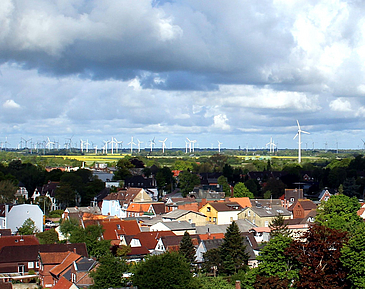The North German town of Heide in the district of Dithmarschen is playing a pioneering role in future-oriented energy technology. The neighborhood Rüsdorfer Kamp has been chosen for the development of a highly efficient heat and power supply. The aim is to achieve near complete utilization of renewable energy, and especially those amounts of wind energy that are currently lost owing to system inflexibility and failure to cope with bottlenecks in the electricity grid.
Funding in an amount of 25 million euros
The University of Bremen has been given the task of coordinating the large-scale project involving a total of 20 different partners. The contract will be carried out by the interdisciplinary Institute for Advanced Energy Systems (AES), working together with the development agency for the region of Heide, as well as Steinbeis Innovationszentrum (SIZ) energie+, which is affiliated to the Technical University of Braunschweig, and others. Over the next five years, the project titled “QUAREE 100” will receive 25 million euros from the Federal Government, 5.6 million of which has been allocated to the University of Bremen. Besides the AES, the University is also represented by the Sustainability Research Center (artec) and the Center for Environmental Research and Sustainable Technology (UFT).
Benefit for students too
Stefan G. Reisemann, Professor for Resilient Energy Systems, is delighted at the news: “Thanks to this handsome funding, we will now be able to test our design concepts for sustainable and robust energy systems and the highly innovative energy technology being developed in the University’s Faculty of Production Engineering. The project not only creates a bridge between research and practice: It also constitutes an important step towards implementing the turnaround in energy policy. It will also directly benefit our students specializing in energy systems”.
Priority for regenerative sources of energy
The neighborhood of Rüsdorfer Kamp comprising 50 acres of multi-storey residential properties built in the 1950s and 1960s will receive a significant and sustainable boost. A main focus is being placed on implementing the production and supply of energy in the neighborhood itself, while taking into account both the centralized as well as decentralized sources of regenerative energy sources available. The project encompasses heat and power supply as well as mobility. Electro-chemical processes are to be used to capture the surplus energy generated during off-peak periods in battery and gas reservoirs. In order to ensure supplies even under extreme conditions or system breakdown, energy systems must be highly robust and resilient. It is intended that the neighborhood will trigger a stabilizing effect for the whole energy system. This is the specific scientific issue for the University of Bremen.

![[Translate to English:] Zur Startseite des KKBS](/fileadmin/user_upload/fachbereiche/fb3/kksb/logo/KKSBSchriftMitLogoSchwarz_90.png)
